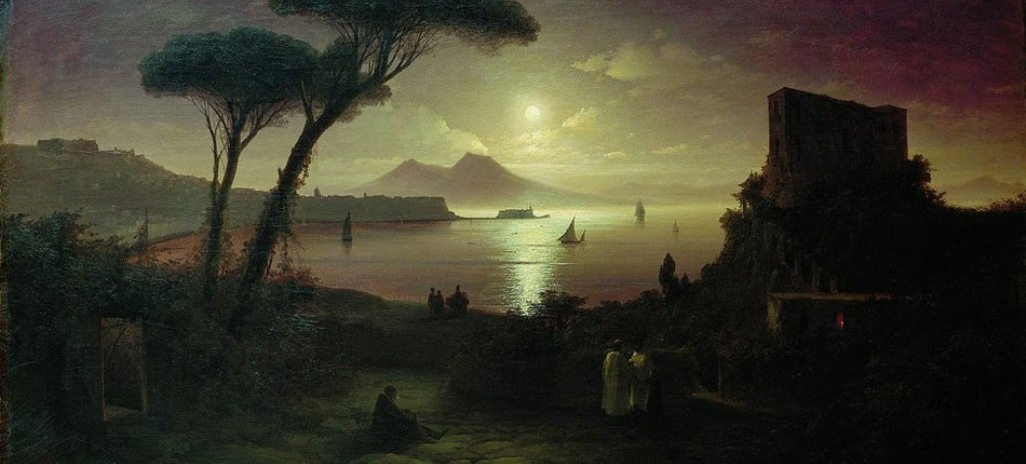Mysterium Tremendum is a central idea in Rudolf Otto’s “The Idea of the Holy”
I muse upon the sea’s expanse
And soar into a troubled trance.
A distant storm front drowns the sun—
Light fades into oblivion.
I ponder well mortality,
Though far from storm’s ferocity,
As dusk settles a resting gull
And low tide’s tempo brings a lull.
I lie against a dune, look deep
At stars so wide, so far, so steep
With worlds that circle and revolve—
I feel my bookish mind dissolve.
Our solar home? A cobalt dot
In orbit round a blazing spot.
Between the stars, the coldest space
Fills me with dread and chills my face.
Submerged beneath colossal night,
I seem a ghost clothed in moonlight.
I am awestruck—a shooting star
Singes the night with scorching scar.
As stars waltz round in gay ballet,
My veiny hands, uplifted, pray.
Despite the timeless void and death,
The Spirit breathes in vital breath.
Peter Venable has been writing poetry for 50 years. He has been published in Windhover, Third Wednesday, Time of Singing, The Merton Seasonal, American Vendantist, The Anglican Theological Review, and others. He is a member of the Winston Salem Writers.




A beautiful impressive poem that, after reading it, leaves you with a widely reaching spirit of satisfaction.
This poem vividly captures with its striking imagery the sense of being overwhelmed by our own minuteness, frailty and vulnerability before the awe-inspiring immensity of the universe that surrounds us, and how that instills in men the impulse to lift dependent, aging, “veiny” hands to the One who is the source of all being, power, and existence– the one who breathes us life-giving breath. Well done.
“Leaves you,” perhaps, but leaves me with some dissatisfaction. And just what does “a widely reaching spirit of satisfaction” mean, anyway? The iambic intent of the poem forces the reader to scan (in stanza 2, line 3) “settles” as set-TLES rather than the normal SET-tles. There are other awkward metrical mishaps that the attentive reader should be able to discover for him- or herself. These are not lethal, but they make one wonder what you are up to. The last two lines of the poem have significance you may not have considered. “Breathes” and “breath” are akin to the Sanskrit “atman,” meaning breath or spirit. I didn’t realize that you were an Indo-europeanist. It just goes to show that , semi-consciously, we all pull out of the void substance from from our linguistic heritage. Nicely done, except, perhaps, is stanza five where you attempt to rhyme “colossal night” with “clothed in moonlight.” The former element is iambic, but the latter is trochiac, which means that you have tried to rhyme an accented syllable with an unaccented syllable, which is a bad idea and results in a poor rhyme.
Sorry. I started out responding to the commenter, but ended up addressing the author. Oh well.
C.B.,
Along the lines of linguistic heritage: your comment reminded me of the Hebrew word “neshamah”, which in the Old Testament of the Bible is in some places translated ‘breath’ (as in Genesis 2:7) and in others ‘spirit’ (as in Proverbs 20:27).
Anna, I do not dispute anything you have written, but I wonder whether you were aware of the fact that there was once a comparative linguist who aspired to link the Semitic language group with the Indo-European language group. His attempt was deemed a failure, and that just goes to show that coincidences abound and that somewhere in humanity’s deep past all languages are connected in some subtle way. No human culture I know of has existed without any language at all. Taking this in the highest mythological sense, it all goes back to the Tower of Babel. And now, to each other, our speech is mostly babble. This problem was temporarily rectified in the New Testament Acts of the Apostles, but nowadays we’ve fallen far short of that ideal.
C.B., no, I was not aware of that. In fact, it was only recently that I became aware of the idea of a PIE language, and that was through an infographic! I love words, but I am not at all well-read on the topic of etymology; I only threw that out there on the chance that it might have tied in somewhere. It doesn’t surprise me too much to learn that in this case it appears to be a coincidence. As you say, there is a connection somewhere, mysterious and elusive though it may be. You referenced the tower of Babel; I might add, in the New Testament of the Bible God refers to himself as “the Word.”…
Yes, indeed we do fall far short of that ideal of unconfused communication. Sadly, in many instances even among speakers of the same language, our words are mere babble to one another. One thing I love about (good) poetry is how a whole lot of meaning can be packed into a few carefully selected words.